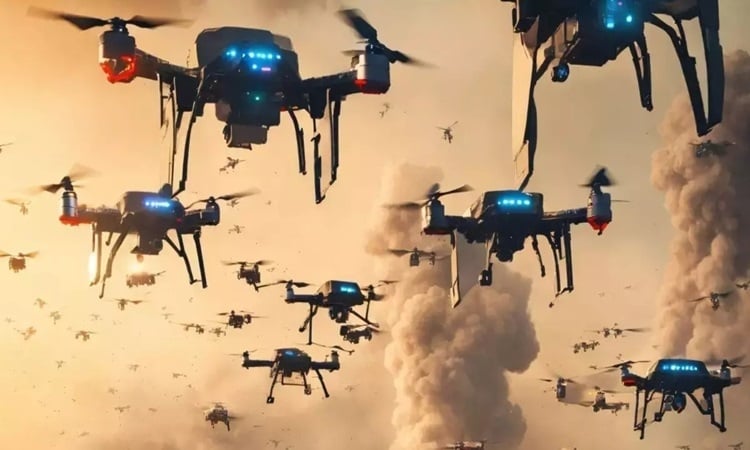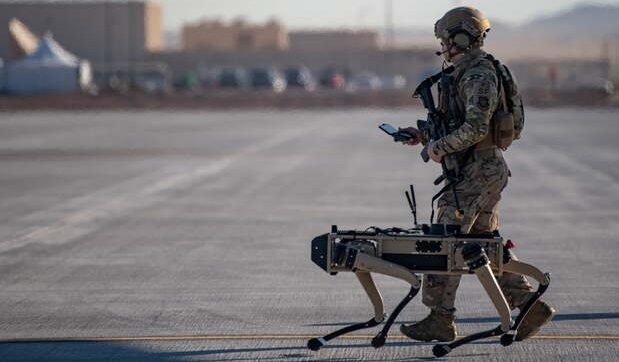2024 is the year of rapid deployment of artificial intelligence (AI) systems in all areas of human life, including the military .
The integration of AI into weapons is proceeding rapidly, and combat testing has been evident in recent conflicts, all of which demonstrate that AI will radically change combat operations in the coming years.
What can artificial intelligence do?
According to the Russian scientific magazine Vzglyad (Perspective), if you want to see how AI has been applied in the military, look at how it is being used in the US Army.
In April 2023, Pentagon sources said that the US combat AI will be tested in the conflict in Ukraine under the name Maven or smart guy. However, in fact, the AI testing under the Maven program has been conducted by the US Army before.
In 2017, the US 18th Airborne Corps began testing an AI intelligence support system, later called Maven, in Afghanistan. The 101st Airborne Division, the 82nd Airborne Division and many other units fighting in Afghanistan have since used AI-enabled equipment to fight insurgents.
 |
Artificial intelligence is advancing rapidly with big data and advanced machine learning, especially in the military field. Photo: Defense News |
By 2020, the Americans continued to test combat AI in the 18th Airborne Corps. The system was tested and conducted during the Red Dragon exercise. The US Marine Corps also participated in this process.
During testing and actual use, AI has shown many significant advantages. While traditional ground reconnaissance before campaigns takes months with many errors and variables, AI can do it within 12 hours and does not miss any suspicious information.
Even at the tactical level, the AI's ability to read map data is impressive. What a reconnaissance unit needs to do in 12 hours, the AI only needs a little over a minute.
In addition, according to the Pentagon's assessment, AI has significantly changed the combat capabilities of soldiers on the battlefield. If in the past, about 80% of soldiers' efforts were searching for targets, then with the support of AI, this figure is only 20%. Significant resources are focused on direct combat missions and destroying targets.
Assessing the US Maven program, Topwar military magazine said: “Today, Maven's potential is so great that even a small unit, such as an artillery battalion, can take on 1,000 targets per hour. More than the number of fire targets the unit can attack.”
The success of Maven has led the US Army to continue to contract with Palantir Technologies, the company that developed this AI technology. In 2024, Palantir Technologies received a contract to deploy an AI system based on the development of the Maven project with a total value of more than 500 million USD.
The next priority for AI integration is the Advanced Field Artillery Tactical Data System (AFATDS), which is an automated data processing and target designation system for artillery. Significant AI-assisted differences give the Army confidence in the prospect of automated artillery systems in all aspects of combat, with human intervention simply selecting priority targets and pressing the fire button.
"The nemesis" of electronic warfare
With the development of AI, the question arises, what would it be like to fight an army that uses AI massively against a traditional army?
The computing power will allow the AI to continuously review all the material captured from the reconnaissance process and not miss anything. Any changes, such as the target on the ground, will be analyzed almost immediately. If there is a sniper under this hill, then some kind of weapon will immediately target that location.
Classical radio reconnaissance would also become impossible. GPT chats would support human-like radio communications. Hacking radio networks and gaining access to their conversations would only confuse enemy intelligence.
 |
| What happens when fighting machines don't need human intervention? Photo: Topwar |
AI is enabling previously unimaginable capabilities. For example, AI can listen to background noise from the radio headsets built into each mechanized gunner’s helmet to detect enemy artillery fire, and thanks to the number of acoustic sensors on the soldier, AI can localize and pinpoint the coordinates of the target for precise counterattacks. The same goes for any sound source, such as the sound of a tank emanating from somewhere in the bushes.
“Electronic countermeasures will lose their meaning because each combat unit will be able to operate independently and react instantly,” Russian military expert Alexander Timokhin told Vzglyad newspaper.
According to expert Alexander Timokhin, there will be swarm weapons, not necessarily drones. They can be smart munitions or conventional weapons themselves with integrated intelligent control systems. For example, an anti-tank missile can hit a target in a trajectory that a human shooter cannot do thanks to information about the target's location. In combat, every tactical trick will only work once, and AI will help plan so that any similar mistakes will never be repeated.
TUAN SON (synthesis)
* Readers are invited to visit the World Military section to see related news and articles.
Source: https://baodaknong.vn/intelligence-human-power-can-be-a-power-in-future-conflicts-240045.html


































































































Comment (0)